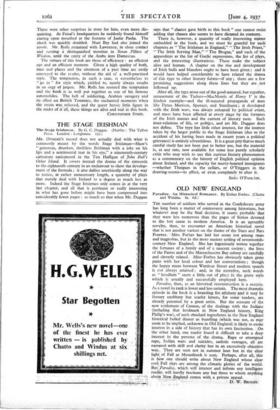THE STAGE IRISHMAN
The Stage Irishman. By G. C. Duggan. (Dublin : The Talbot Press. London : Longman. iss.)
MR. DUGGAN'S record does not actually deal with what is commonly meant by the words Stage Irishman—Shaw's " generous, drunken, thriftless Irishman with a joke on his lips and it sentimental tear in his eye," a nineteenth-century caricature caricatured in the Tim Haffigan of john Bull's Other Island. It covers instead the drama of the sixteenth to the eighteenth century in an endeavour to show the develop- ment of the formula ; it also dallies uncritically along the way to notice, at rather unnecessary length, a -quantity of plays that merely deal with Ireland to a degree as much less as more. Indeed the Stage Irishman only comes in at the very last chapter, and all that is pertinent or really interesting in what has gone before might have been compressed into considerably fewer pages : so much so that when Mr. Duggan says that " chance gave birth to this book " one cannot resist adding that chance also seems to have dictated_ its. contents.
There is, however, a quantity of really interesting matter embedded in the book, and we must be grateful for such chapters .as "The Irishman in England," " The- Irish Priest," " The Irish Serving Man," " The Brogue," and such of the appendices as the list of Gaelic expressions, the list of plays, and the interesting illustrations. These make the subject alive and human. A chapter on the rise and development of Irish bulls and blunders ought to have been given ; and it would have helped considerably to have related the drama of this type to Other literary forms—if any ; there are a few promising suggestions along these lines but they are not followed up.
After all, the type arose out of the good-natured, but superior, amusement of the Tudors—MacMorris of Henry V is the kindest example—and the ill-natured propaganda of men like Fynes Morison, Spenser, and Stanihurst ; it developed with the Irish wars, was always coloured by political event, and must have been affected at every stage by the fortunes of the Irish masses and the current of literary taste. Such inter-relations of life, or politics, and art Mr. Duggan does not define. The type has little other interest, for the interest taken by the larger public in the Stage Irishman (due to the accident of his having been made in recent years a political grievance) is entirely adventitious. It is a great pity that so much careful study has not been put to better use, but the material is, at any rate, now available for some less purely scholarly critic who may wish to use this curious literary phenomenon as a commentary on the history of English political opinion about Ireland, and the capacity for merry-hearted immigrants —whether Theigues in the cellars, or O'Triggers in the drawing-rooms—to affect, or even completely to alter it.
SEAN O'FAOLAIN.










































 Previous page
Previous page